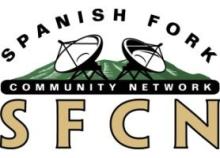Spanish Fork Upgrading to Fiber in Utah
Spanish Fork Community Network (SFCN) recently announced it is upgrading its cable network to a fiber optic network. The network has already started improving services by increasing speeds for the highest tiers at no extra cost reports the Herald Extra.
Residents and businesses in the town of approximately 37,000 have relied on the municipal cable network since 2001. Over the past 14 years, the network has come to provide triple-play to 80 percent of Spanish Fork homes.
Officials kicked off construction on September 3rd:
“We’re excited this is the next step for the SFCN network," [SFCN Director John] Bowcut said. "We’ve always planned on doing fiber to the home, and now we’re in the fiscal position where we can go ahead and install that for our customers."
Customers who choose to remain with the lowest tier - 12 Mbps / 3 Mbps - will remain on the coax infrastructure, says Bowcut, but will be switched to fiber if they choose to upgrade to a higher tier.
The city made its last bond payment for the existing system this year and will use newly available funds from retiring the debt to fund the upgrade. Assistant City Manager Seth Perrins describes the early deployment as "soft" so officials can obtain a better understanding of cost demands, construction management, and how long the project will take. They estimate the project will be complete by 2020.
According to Bowcut, Premium service that is now 120 Mbps / 15 Mbps will transition into symmetrical gigabit service for around $68 per month. PLUS service, currently 60 Mbps / 10 Mbps, will be upgraded to 100 Mbps symmetrical for approximately $45 per month. The Starter tier at 12 Mbps / 3 Mbps will remain $35 per month. All three tiers offer discounts when purchased with TV service.
Read more about Spanish Fork, one of the early municipal networks, and listen to Chris interview John Bowcut during Episode #60 of the Community Broadband Bits podcast. We have an updated interview with John ready for an upcoming podcast.



